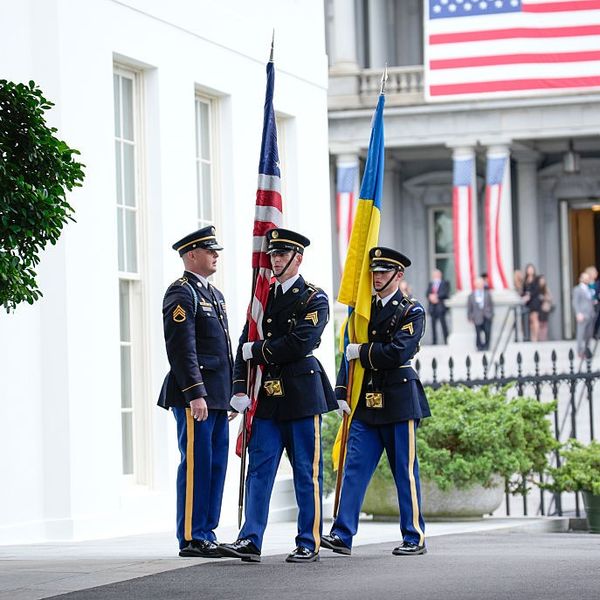OPINION — In 1992, Congress passed legislation in the fiscal 1993 Defense Authorization Bill that required the establishment of a five-year program “to assist eligible members of the armed forces, after separation from active duty, to obtain certification as secondary or elementary school teachers or teachers' aides; and to facilitate the employment of such persons by local educational agencies experiencing a shortage of teachers or teachers' aides,” according to the House-Senate conference report on the measure.
I bring up what has been called the Troops-to-Teachers (TTT) program because on August 3, the Government Accountability Office (GAO) released a report that traced the up-and-down government support for this meritorious program which today, faces an uncertain future.
Its funding, management and oversight over the years has passed between the Defense and Education Departments and then back to Defense. On October 1, 2020, the Defense Department actually cancelled the TTT program canceled and ordered it ended within the next year, saying it was “realign[ing]…resources to higher priority programs more closely aligned to the [Trump administration’s] National Defense Strategy.”
But in 2021, Congress disagreed. In the fiscal 2022 Defense Authorization bill, it mandated continuation of the TTT program until at least July 1, 2025, saying in its report, “Since its inception, the Troops-to-Teachers program has successfully placed many veterans in teaching positions throughout the country, especially in high need school districts.”
In response, the Defense Department provided extensions that allowed existing state grantees to continue providing counseling and referral services to military participants until May 2023. However, no additional funds were approved in the fiscal 2022 appropriation bill and since then, TTT has operated with minimum staff and resources.
In the current fiscal 2024 Defense Authorization bill now before Congress, the House has a provision to have the TTT program run an additional two years and include providing retiring military as instructors and administrators for high school Junior ROTC. No such proposal is in the Senate bill, nor are there funds for TTT included in the current versions of the fiscal 2024 Defense appropriations bills.
What national security news are you missing today? Get full access to your own national security daily brief by upgrading to Subscriber+Member status.
I have traced the TTT program history and found that during the past 28 years, it has produced over 40,000 teachers drawn from the military ranks.
The GAO’s report two weeks ago, said, “Although Troops-to-Teachers program participants comprise less than one percent of the national teacher workforce, many participants are from groups that typically are underrepresented in teaching.” It pointed out that nationally, about 80 percent of K-12 teachers are women and 20 percent are non-White.
However, the GAO reported, “In contrast, from fiscal years 2014 through 2020, almost three-quarters (72 percent) of registered participants in the Troops-to-Teachers program were men, and 42 percent were non-White.” GAO added, “The Troops-to-Teachers program long has been recognized as having potential to help increase gender balance and racial diversity in classrooms. This is important because, as we reported in October 2022, studies show that students, particularly students of color, benefit from having teachers who look like them.”
A 2005 study by the National Center for Education Information found that “Military teachers are filling the science, technology, engineering, and mathematics gap experienced in many schools. More than 27 percent of TTT participants teach mathematics, compared to seven percent of teachers nationwide. Forty-six percent teach the sciences (biology, geology, physics, and chemistry) compared to all U.S. teachers, and 44 percent teach special education, compared to 19 percent of all teachers.”
The TTT program has been run by personnel in the Defense Activity for Non-Traditional Education Support (DANTES)—a DOD unit that primarily provides active military with in-service, education-related counseling and distance learning courses. For the TTT program it has registered individuals, identified high-need schools and districts, and made determinations about who qualifies for bonuses and stipends.
Here is how TTT is supposed to work.
All current and honorably discharged members of the Armed Forces, including the National Guard, Reserves and veterans who have a bachelor's degree or alternative training may apply.
If approved, (and of those applying only a small number are approved) they must agree to obtain certification or licensing as an elementary, secondary, or vocational or technical teacher and accept full-time employment as a teacher for at least three years with a high-need school district or public charter school.
Looking for a way to get ahead of the week in cyber and tech? Sign up for the Cyber Initiatives Group Sunday newsletter to quickly get up to speed on the biggest cyber and tech headlines and be ready for the week ahead. Sign up today.
They can get individual counseling and up to a $5,000 stipend for education leading to a teacher certification. They can get up to a $10,000 bonus if they end up in a high-need school, or teaching subjects such as math and science.
The individual counseling is provided at the state level and states were provided DoD grants to operate their TTT offices, according to program officials.
When Congress in December 2021, reinstated authorization for the Troops-to-Teachers program, it did not appropriate the $15 million although it had been authorized. Defense officials, through the DANTES unit, awarded about $1.38 million for fiscal year 2022 to 12 state programs from its own funds. In addition, four other states used funds from existing TTT awards.
With the TTT program set to sunset July 1, 2025, Defense officials told the GAO they interpreted Congress’ 2021 intent – having not supplied additional appropriations — was to support “participants who already were in Troops-to-Teachers prior to DoD canceling the program until they complete their teacher certification programs. DoD said it continues to meet that intent.”
In past years, the Defense Department tracked the number of participants hired by high-need schools, districts, or public charter schools and TTT financial assistance they received. But after the 2021 shutdown of its data management system, 2020-to-2022 data has been unavailable.
Lack of current information and statistics about the program’s effectiveness has been limited and is affecting its placement of participants in eligible schools with critical teacher shortages, according to the GAO.
However, earlier Troops-to-Teachers annual reports “illustrate how the program was serving high-need schools,” the GAO report said.
For example, according to the GAO, in fiscal 2017, 273 participants nationwide collectively received nearly $2 million in financial assistance for teaching in high-need schools. In fiscal 2018 through 2020, 155 participants each received up to $10,000 in financial assistance for teaching science, math, foreign language and special education in a high-need school, and 856 participants each received up to $10,000 in financial assistance for teaching other needed academic or technical subjects.
The GAO said that officials interviewed from eight school districts in Arizona, Florida, and Montana, “said they generally wanted more information about how the Troops-to-Teachers program could help them hire more teachers.”
Meanwhile, at least one state has established its own program.
In Florida in 2022, to combat teacher shortages, the Florida Department of Education offered a five-year temporary teaching certificate as part of a program to get military personnel and veterans as teachers without a bachelor’s degree requirement.
It's not just for the President anymore. Are you getting your daily national security briefing? Subscriber+Members have exclusive access to the Open Source Collection Daily Brief, keeping you up to date on global events impacting national security. It pays to be a Subscriber+Member.
Perhaps that was because one earlier Florida study that examined reading and mathematics achievement found, “Students taught by TTT participants had significantly higher achievement levels over students taught by others with equal teaching experience.”
Florida is reaching out for those with at least 48 months of military service with an honorable or medical discharge; at least 60 college credits with a 2.5 grade point average and passage of a Florida subject area exam for bachelor’s level subjects. As of last April, Florida had received 500 applications for the program.
In 2013, the North Carolina legislature passed legislation that pays more to military service members who wish to teach K-12, based on duties while they were in active military service. It provides that for every two years of full-time instructional or leadership duties while in the military, an individual would get one year of teaching credit, which could mean $1,000 in added yearly pay.
Back in 2021, when the Troops-to-Teachers program was faced with cancelation, officials from the American Legion, Veterans of Foreign Wars, Student Veterans of America, Disabled American Veterans and Veterans Education Success urged Congress to reverse the Defense Department’s decision.
In a letter two years ago, they wrote, “Studies have shown that Troops-to-Teachers educators fill thousands of vacancies in high-needs schools and subject areas…are considered effective instructors; have high job and life satisfaction; and even have a positive effect on increasing student likelihood to serve. Allowing the Troops-to-Teachers program to sunset would go against America’s critical need to support our children’s education.”
It was the right move to make then; it’s even more needed today.
The Cipher Brief is committed to publishing a range of perspectives on national security issues submitted by deeply experienced national security professionals.
Opinions expressed are those of the author and do not represent the views or opinions of The Cipher Brief.
Have a perspective to share based on your experience in the national security field? Send it to Editor@thecipherbrief.com for publication consideration.
Read more expert-driven national security insights, perspective and analysis in The Cipher Brief











